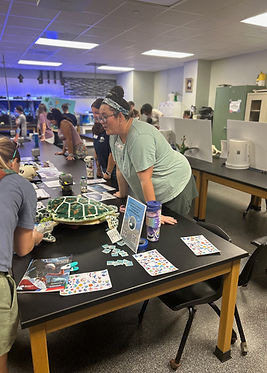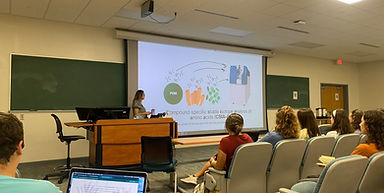The Ramirez Lab

Outreach & DEI
Science should serve and include everyone
“If I get to be me, I belong. If I have to be like you, I fit in.”
—Brené Brown, Braving the Wilderness
The Ramirez Lab is guided by the belief that science should serve and include everyone. We recognize that each person brings with them unique skill sets and experiences that shape how they think and approach new problems, making the inclusion of people that come from diverse backgrounds fundamental to excellence and innovation in STEM. Nevertheless, structural barriers in our educational systems continue to impede equal access to science education and careers for a wide range of people. We are thus committed to using our skills, knowledge, and networks to (1) foster an equitable and inclusive educational environment where everyone has equal chance at success, (2) build institutional cultures where everyone feels welcomed, valued, and supported, and (3) advance institutional and societal efforts to reduce barriers faced by minoritized people in STEM.
Only through collective, persistent action can the marine sciences become fully accessible and inclusive of all people regardless of race, ethnicity, gender, gender identity, sexual orientation, socioeconomic status, disability, age, nationality, immigration status, parenthood status, or religion.
Below you can learn more about some of the projects, initiatives, and programs the members of the Ramirez Lab have led or participated in that promote science and ocean literacy in the public sphere, enhance student professional development, and advance diversity, equity, and inclusion in STEM.
We acknowledge that we occupy, work, and learn on the traditional and enduring homelands and waterways of many Indigenous peoples, including the Yę Iswą People (Catawba Nation; UNCW). We honor theses peoples, who over generations before us stewarded the land, sea, and their resources. We also respect and support their perseverance in the face of widespread historic territorial appropriation, genocide, and enslavement. The Ramirez lab remains committed to decolonizing our practice and continuing to learn how to be better stewards of the land and sea we inhabit, study, and value. We encourage everyone to learn more about the past and present-day Indigenous communities where we, now too, live.







CMS Open House
CMS open house happens once a year, we spend the day talking to our community about why our work is important and teaching little ones about marine biology.



.jpg)




.jpg)


.jpeg)
OCEANS 15 & 17
Oceans 17 is an immersive three-week program where teens explore marine science through real-world lab and field research guided by UNCW faculty, staff, and graduate mentors.

.jpg)


_JPG.jpg)


.jpeg)

Public Talks & Conferences











.jpg)

Supporting Women in STEM
